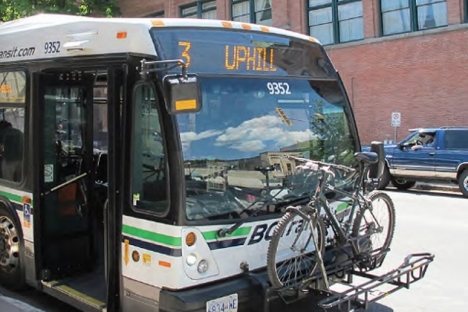Ministry boosts funding for BC Transit over next three years
The British Columbia government is providing $324 million in operating contributions to BC Transit over the next three years, Transportation and Infrastructure Minister Todd Stone recently announced.
This provincial funding represents a $12.7-million increase over three years, compared to 2015-16 budget levels. The new funding will go toward BC Transit operating costs – which will mean more service hours, new routes, improved HandyDART services and more frequent buses.
“We recognize the importance of affordable transit in B.C. communities, which is why our government has increased funding, and also provided BC Transit and its partners with maximum flexibility to use this money as efficiently as possible over the next three years,” said Stone.
“Our local government partners have worked with BC Transit and with the ministry over the last year to identify savings and third-party revenue sources to ensure that every possible dollar in the transit system is invested in more service.
“These efforts, and further efficiencies that will be identified in the upcoming Crown review of BC Transit, will ensure that people will continue to receive the transit services they rely on.”
The B.C. government will provide $106 million in operating funds for 2016-17, $108 million in 2017-18, and $110 million in 2018-19.
“This boost in funding is great news for transit riders across the province because it means new routes and more frequent buses in our communities, getting people to where they need to go,” said Health Minister and MLA for Kamloops-North Thomson Terry Lake.
“By investing in our transit system, we are encouraging people to get out of their cars and take transit instead.”
The funding includes the recently announced new provincial money for new and expanded transit services for communities located along the Highway 16 corridor in northern B.C., as part of the Highway 16 Action Plan.
“This increased funding from the Province is great news for the over 130 communities we proudly serve,” said BC Transit president and CEO Manuel Achadinha.
“The Province’s commitment to transit with this additional funding will help us meet the growing demands for transit services across the province.”
“Minister Stone and his government have clearly recognized the demand for transit in Kamloops and other communities in the province,” said Kamloops Mayor and director, BC Transit Board of Directors Peter Milobar.
“This increase in funding will help us deliver more transit services for the public, and also honour our commitment to being a greener community.”
The ministry is also providing BC Transit with over $110 million in funds for capital investments over the next three years, and invests about $1 million annually for transit projects on its highways and roads that make taking transit safer and more convenient and comfortable, including bus shelters, wheelchair pads and pedestrian count-down signals.
The government is committed to working with its partners to increase transit ridership, and to continue to support the increased adoption of cleaner-energy buses, such as the new compressed natural gas (CNG) fleets recently introduced in Nanaimo and Kamloops.
B.C. on the Move is government’s new 10-year plan for the improvement of the province’s transportation network.
Over the next three years, the Ministry of Transportation and Infrastructure will invest up to $2.7 billion to improve B.C.’s transportation network.
As a part of B.C. on the Move, the B.C. government committed to maintaining the highest level of operating support for transit per capita in Canada, partnering with communities to replace half of BC Transit’s fleet (about 500 buses) over the next five years, building transit infrastructure to provide more efficient operations and improved transit services, and continuing to seek opportunities to deploy CNG buses in communities throughout the province.
There are three transit contractors — Nelson Transit, Arrow Slocan Lakes Community Service and Trail Transit — operating buses for West Kootenay Transit, which is part of BC Transit.
Nelson Transit and Arrow Slocan Lakes Community Service, are part of West Kootenay Transit, which costs and decisions are shared by Regional District of Central Kootenay, Regional District of Kootenay Boundary, City of Nelson and BC Transit.
Quick Facts:
- British Columbia continues to provide BC Transit with the highest level of operating support for transit per capita in Canada.
- The B.C. government partners with communities to ensure that 90% of British Columbians have access to public transit.
- BC Transit serves over 130 communities of all sizes outside of Metro Vancouver.
- With costs shared between local governments and the Province, BC Transit operates about 1,000 buses and carries more than 51 million passengers each year.

























Comments